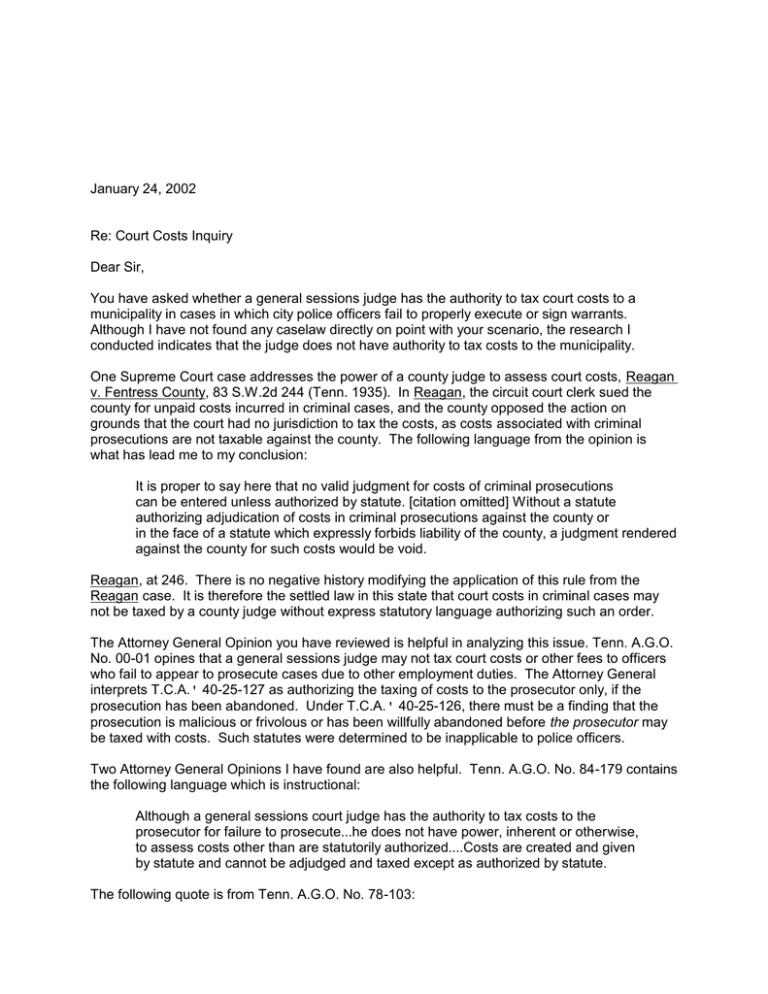January 24, 2002 Re: Court Costs Inquiry Dear Sir,
advertisement

January 24, 2002 Re: Court Costs Inquiry Dear Sir, You have asked whether a general sessions judge has the authority to tax court costs to a municipality in cases in which city police officers fail to properly execute or sign warrants. Although I have not found any caselaw directly on point with your scenario, the research I conducted indicates that the judge does not have authority to tax costs to the municipality. One Supreme Court case addresses the power of a county judge to assess court costs, Reagan v. Fentress County, 83 S.W.2d 244 (Tenn. 1935). In Reagan, the circuit court clerk sued the county for unpaid costs incurred in criminal cases, and the county opposed the action on grounds that the court had no jurisdiction to tax the costs, as costs associated with criminal prosecutions are not taxable against the county. The following language from the opinion is what has lead me to my conclusion: It is proper to say here that no valid judgment for costs of criminal prosecutions can be entered unless authorized by statute. [citation omitted] Without a statute authorizing adjudication of costs in criminal prosecutions against the county or in the face of a statute which expressly forbids liability of the county, a judgment rendered against the county for such costs would be void. Reagan, at 246. There is no negative history modifying the application of this rule from the Reagan case. It is therefore the settled law in this state that court costs in criminal cases may not be taxed by a county judge without express statutory language authorizing such an order. The Attorney General Opinion you have reviewed is helpful in analyzing this issue. Tenn. A.G.O. No. 00-01 opines that a general sessions judge may not tax court costs or other fees to officers who fail to appear to prosecute cases due to other employment duties. The Attorney General interprets T.C.A.' 40-25-127 as authorizing the taxing of costs to the prosecutor only, if the prosecution has been abandoned. Under T.C.A.' 40-25-126, there must be a finding that the prosecution is malicious or frivolous or has been willfully abandoned before the prosecutor may be taxed with costs. Such statutes were determined to be inapplicable to police officers. Two Attorney General Opinions I have found are also helpful. Tenn. A.G.O. No. 84-179 contains the following language which is instructional: Although a general sessions court judge has the authority to tax costs to the prosecutor for failure to prosecute...he does not have power, inherent or otherwise, to assess costs other than are statutorily authorized....Costs are created and given by statute and cannot be adjudged and taxed except as authorized by statute. The following quote is from Tenn. A.G.O. No. 78-103: It is well-settled that no judgment can be rendered against the state or county for costs of criminal prosecutions, except such as are expressly authorized by statute, and it is equally well settled that the requirements of the statutes in regard to costs chargeable to or adjudged against the state must be strictly complied with. [citations omitted] When first reading T.C.A.'' 40-25-126 and 127, I determined that the term “prosecutor” could be interpreted as including a municipality employing an officer who swore out a warrant, as the city has an interest in prosecuting charges under such circumstances. After reading the abovequoted case and Attorney General Opinions, however, I concluded that the statutes must be strictly construed, with only the plain meaning of the term “prosecutor” being applicable. As such, these statutes provide no authority for the general sessions judge to tax costs to the city in cases in which the officers have failed to properly execute or complete a warrant. I have not found any other statute in the Tennessee code providing for such authority, and therefore conclude that the general sessions judge lacks the power to tax costs to the city under these circumstances. I hope this information has been helpful. Please feel free to contact me should you have any further questions. Sincerely, Melissa A. Ashburn Legal Consultant cc: Mr. Ron Darden Management Consultant


